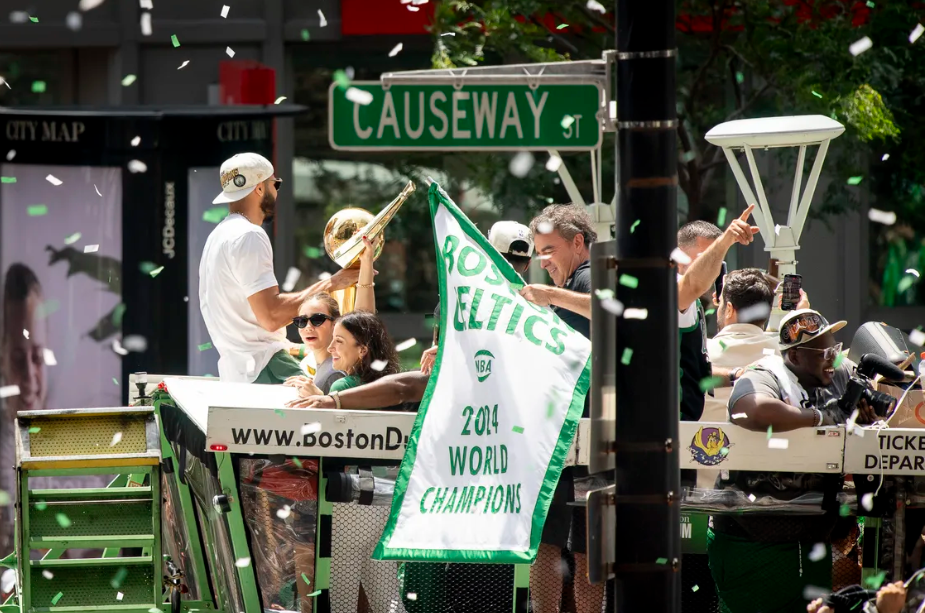
The Celtics have dished out over a billion dollars in extensions to keep the championship team together. How might that play out?
The Boston Celtics are gearing up for another run, possibly more so than any team in the last two decades.
With the signing of Sam Hauser to a four-year, $ 45 million contract extension on Sunday, the Celtics have ensured that their entire top nine players from last season’s championship roster will return for at least the upcoming year. To my knowledge, this is the first time in at least twenty years that a top nine has remained intact. I couldn’t even find an instance of a top eight staying the same, let alone a top nine.
This is quite unprecedented, raising questions about whether it’s a smart move. It’s also important to consider whether they truly had other options, and most importantly, if it will even matter in the long run. I’m about 91.2% convinced it’s a good strategy, but let’s explore the different scenarios the Celtics find themselves in to better understand the situation.
To clarify: Jayson Tatum, Jaylen Brown, Derrick White, Jrue Holiday, Sam Hauser, and Payton Pritchard are all signed for at least the next four years, which is remarkable. Kristaps Porzingis is under contract for the next two years, while Al Horford and Luke Kornet will become unrestricted free agents next summer.
This represents the Celtics’ entire core rotation. They are likely to lose Oshae Brissett to free agency, a minor contributor last year, but they have retained Xavier Tillman, who effectively filled Brissett’s role during the playoffs. He proved particularly effective in crucial moments during the NBA Finals, meaning that, for all practical purposes, the Celtics are essentially maintaining their top ten players.

Let’s start with the fun stuff. This is amazing, you’re excited, I’m excited, everyone is excited. These contracts are much more enjoyable than last summer’s media frenzy over the Jaylen Brown extension, which was the richest contract in NBA history at that time. Celtics fans mostly loved the contract, but it was overshadowed by the bitter taste of a crushing Eastern Conference Finals defeat.
However, after winning the NBA Finals, this offseason feels like it’s been drenched in Nutella, powdered sugar, and topped with strawberries and cream—essentially a 5-year-old’s dream IHOP order. Everything feels fantastic, thanks to the euphoria of winning the NBA Finals. Kornet’s one-year deal? Fantastic. Tillman returning? Incredible. Derrick White and Jayson Tatum extensions on the same day? Someone start another Duck Boat parade.
Depending on where you fall on the Official Celtics Love/Hate Spectrum — from “1960s Los Angeles Lakers Fan” to “50-Year Celtics Season Ticket Holder” — you’ll view these extensions differently.
On the positive side, the Celtics just won the NBA Finals and are favorites to win again at least through November. When healthy, they’re the best team. While the Eastern Conference has improved, it’s not like when LeBron James arrived in Miami in 2010 to dominate the conference.
Here’s the situation: the Milwaukee Bucks are about the same, but Giannis Antetokounmpo is still a major threat. Paul George joining the Philadelphia 76ers doesn’t guarantee them success but makes them stronger. Mikal Bridges on the New York Knicks aims to recreate college championship success in the NBA. While nothing is certain, these teams have improved, which is the goal for contenders.
The overly optimistic Celtics fan might argue that no other team stands a chance, but that’s probably too much optimism. Strength attracts competition, and the Eastern Conference won’t just bow down to a strong Celtics roster.
Meanwhile, the 1960s Lakers fans might focus less on the roster quality and more on the financial implications. By the 2025-26 season, with all these extensions, the Celtics will have the highest payroll in NBA history and will likely exceed the NBA’s “Second Apron” luxury tax threshold for two consecutive years.
I don’t want to get too deep into finances, but because the Celtics will surpass this high luxury tax threshold twice, they’ll face restrictions on roster changes, limited to veteran minimums and draft exceptions. Their first-round pick will also be pushed to the end of the round.
There’s been much speculation about the “Second Apron,” with many viewing it as the NBA’s way of preventing superteams by imposing severe penalties for exceeding the luxury tax. But it seems the Celtics are going to exceed it. Whatever agreement Brad Stevens and Wyc Grousbeck have seems to be “sign everyone and figure out the rest later.” This means their roster flexibility will be minimal, but if everything remains great, it shouldn’t be an issue.
However, there’s always that 8.8 percent chance that things could go wrong. No matter how great everything looks on paper, things can go awry in the NBA. Teams have gone all-in, built superteams, and failed spectacularly, like the Brooklyn Nets.
Former Celtics assistant Jay Larranaga often told Brad Stevens, “If we’re not trying to improve, we’ll stop being good,” emphasizing the importance of staying aggressive. Despite the risks, what were the Celtics going to do? Not re-sign the team that just won the NBA Finals?
Whether this strategy backfires is yet to be seen. The Celtics haven’t sacrificed draft picks to build their superteam. Their challenges are financial, not material, and any future owner will understand the situation. If they need to trade someone to get under the Second Apron if things go wrong, it will only happen because things have already gone wrong.
Seneca the Younger said that worrying before necessary causes unnecessary suffering. When things are going well, it’s better to bet on them continuing to go well rather than stressing about a future that hasn’t materialized. For now, I choose to enjoy the 5-year-old’s IHOP breakfast.

Leave a Reply